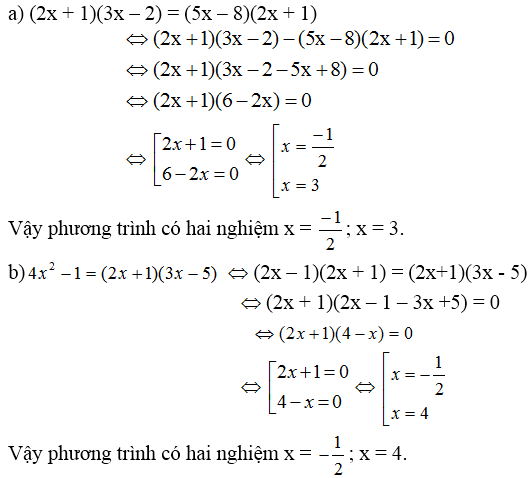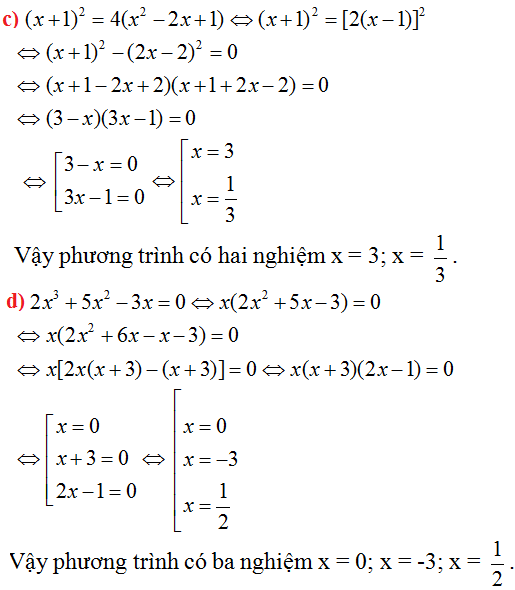
Hãy nhập câu hỏi của bạn vào đây, nếu là tài khoản VIP, bạn sẽ được ưu tiên trả lời.


\(\frac{x+4}{\left(x-2\right)\left(2x-1\right)}+\frac{x+1}{\left(x-3\right)\left(2x-1\right)}=\frac{2x+5}{\left(x-3\right)\left(2x-1\right)}\)
\(\frac{\left(x-3\right)\left(x+4\right)}{\left(x-2\right)\left(2x-1\right)\left(x-3\right)}+\frac{\left(x+1\right)\left(x-2\right)}{\left(x-3\right)\left(2x-1\right)\left(x-2\right)}=\frac{\left(2x+5\right)\left(x-2\right)}{\left(x-2\right)\left(x-3\right)\left(2x-1\right)}\)
\(\Rightarrow x^2+x-12+x^2-x-2=2x^2+x-10\Leftrightarrow x=-4\)
\(\frac{x+4}{2x^2-5x+2}+\frac{x+1}{2x^2-7x+3}=\frac{2x+5}{2x^2-7x+3}\)
\(\Rightarrow\frac{x+4}{2x^2-5x+2}=\frac{2x-5}{2x^2-7x+3}-\frac{x+1}{2x^2-7x+3}\)
\(\Rightarrow\frac{x+4}{2x^2-5x+2}=\frac{x+4}{2x^2-7x+3}\)
TH1:\(x+4\ne0\)
\(\Rightarrow2x^2-5x+2=2x^2-7x+3\)
\(\Rightarrow-5x+2=-7x+3\)
\(\Rightarrow2x=1\)
\(\Rightarrow x=\frac{1}{2}\)
TH2:\(x+4=0\)
\(\Rightarrow x=-4\)

a)(2x+1)(3x-2)=(5x-8)(2x+1)
⇔(2x+1)(3x-2)-(5x-8)(2x+1)=0
⇔(2x+1)(3x-2-5x+8)=0
⇔(2x+1)(-2x+6)=0
⇔2x+1=0 hoặc -2x+6=0
1.2x+1=0⇔2x=-1⇔x=-1/2
2.-2x+6=0⇔-2x=-6⇔x=3
phương trình có 2 nghiệm x=-1/2 và x=3

a,\(\frac{2x+5}{3}-2=\frac{3x-7}{5}\)
\(\Rightarrow5\left(2x+5\right)-30=3\left(3x-7\right)\)
\(\Leftrightarrow10x+25-30=9x-27\)
\(\Leftrightarrow x=-22\)
vậy....................
\(b,\frac{x}{6}+x=\frac{2x+1}{2}\)
\(\Rightarrow2x+12x=6\left(2x+1\right)\)
\(\Leftrightarrow14x=12x+6\)
\(\Leftrightarrow2x=6\)
\(\Leftrightarrow x=3\)
vậy.....................
c,\(\frac{x}{4}-\frac{2x-1}{3}=-\frac{5x}{12}\)
\(\Rightarrow3x-4\left(2x-1\right)=-5x\)
\(\Leftrightarrow3x-8x+4=-5x\)
\(\Leftrightarrow0x=-4\left(PTVN\right)\)
VẬY................
P/s : bạn chú ý \(\Rightarrow\)với \(\Leftrightarrow\)nha

a, Xét x=0 không phải nghiệm pt chia 2 vế cho x2 , đặt t= x+1/x từ đó suy ra phương trình ẩn t, giải ra ta được các phương trình ẩn x rồi ra x.
b, Tách đa thức thành tích của đơn thức (x+1) và 1 đa thức bậc 4 rồi làm như câu a,.
\(2x^4+3x^3-x^2+3x+2=0\)
\(\Leftrightarrow2x^4+4x^3-x^3-2x^2+x^2+2x+x+2=0\)
\(\Leftrightarrow2x^3.\left(x+2\right)-x^2.\left(x+2\right)+x.\left(x+2\right)+\left(x+2\right)=0\)
\(\Leftrightarrow\left(x+2\right).\left(2x^3-x^2+x+1\right)=0\)
\(\Leftrightarrow\left(x+2\right).\left(2x^3+x^2-2x^2-x+2x+1\right)=0\)
\(\Leftrightarrow\left(x+2\right).\left(2x+1\right).\left(x^2-x+1\right)=0\)
\(\Leftrightarrow\orbr{\begin{cases}x+2=0\\2x+1=0\end{cases}\Rightarrow\orbr{\begin{cases}x=-2\\x=-\frac{1}{2}\end{cases}}}\)
\(\text{Vì }x^2-x+1=x^2-x+\frac{1}{4}+\frac{3}{4}=\left(x-\frac{1}{2}\right)^2+\frac{3}{4}\ge\frac{3}{4}\)
Vậy phương trình có nghiệm \(S=\left\{-2,-\frac{1}{2}\right\}\)

Câu 1a : tự kết luận nhé
\(2\left(x+3\right)=5x-4\Leftrightarrow2x+6=5x-4\Leftrightarrow-3x=-10\Leftrightarrow x=\frac{10}{3}\)
Câu 1b : \(\frac{1}{x-3}-\frac{2}{x+3}=\frac{5-2x}{x^2-9}\)ĐK : \(x\ne\pm3\)
\(\Leftrightarrow x+3-2x+6=5-2x\Leftrightarrow-x+9=5-2x\Leftrightarrow x=-4\)
c, \(\frac{x+1}{2}\ge\frac{2x-2}{3}\Leftrightarrow\frac{x+1}{2}-\frac{2x-2}{3}\ge0\)
\(\Leftrightarrow\frac{3x+3-4x+8}{6}\ge0\Rightarrow-x+11\ge0\Leftrightarrow x\le11\)vì 6 >= 0
1) 2(x + 3) = 5x - 4
<=> 2x + 6 = 5x - 4
<=> 3x = 10
<=> x = 10/3
Vậy x = 10/3 là nghiệm phương trình
b) ĐKXĐ : \(x\ne\pm3\)
\(\frac{1}{x-3}-\frac{2}{x+3}=\frac{5-2x}{x^2-9}\)
=> \(\frac{x+3-2\left(x-3\right)}{\left(x-3\right)\left(x+3\right)}=\frac{5-2x}{\left(x-3\right)\left(x+3\right)}\)
=> x + 3 - 2(x - 3) = 5 - 2x
<=> -x + 9 = 5 - 2x
<=> x = -4 (tm)
Vậy x = -4 là nghiệm phương trình
c) \(\frac{x+1}{2}\ge\frac{2x-2}{3}\)
<=> \(6.\frac{x+1}{2}\ge6.\frac{2x-2}{3}\)
<=> 3(x + 1) \(\ge\)2(2x - 2)
<=> 3x + 3 \(\ge\)4x - 4
<=> 7 \(\ge\)x
<=> x \(\le7\)
Vậy x \(\le\)7 là nghiệm của bất phương trình
Biểu diễn
-----------------------|-----------]|-/-/-/-/-/-/>
0 7

a, \(1-\frac{2x-1}{9}=3-\frac{3x-3}{12}\)
\(\Leftrightarrow\frac{108-12\cdot\left(2x-1\right)}{108}=\frac{108\cdot3-9\cdot\left(3x-3\right)}{108}\)
\(\Rightarrow108-12\cdot\left(x-1\right)=108\cdot3-9\cdot\left(3x-3\right)\)
\(\Leftrightarrow108-24x+12=324-27x+27\)
\(\Leftrightarrow3x=231\)
\(\Rightarrow x=77\)
c,\(\frac{3}{4x-20}+\frac{15}{50-2x^2}+\frac{7}{6x+30}=0\)
\(\Rightarrow3\cdot\left(50-2x^2\right)\cdot\left(6x+30\right)+15\cdot\left(4x-20\right)\cdot\left(6x+30\right)+7\cdot\left(4x-20\right)\cdot\left(50-2x^2\right)=0\)
\(\Leftrightarrow900x+4500-36x^3-180x^2+360x^2+1800x-1800x-9000+1400x-56x^3-7000+280x^2=0\)
\(\Leftrightarrow-92x^3+460x^2+2300x-11500=0\)
\(\Leftrightarrow92x^3-460x^2-2300x+11500=0\)
\(\Leftrightarrow\orbr{\begin{cases}x=-5\\x=5\end{cases}}\)
a) Thay x = 3 vào bất phương trình ta được: 2.3 + 3 < 9 <=> 9 < 9 (khẳng định sai)
Vậy x = 3 không là nghiệm của bất phương trình2x + 3 < 9
b) Thay x = 3 vào bất phương trình ta có: -4.3 > 2.3 + 5 => -12 > 11 (khẳng định sai)
Vậy x = 3 không là nghiệm của bất phương trình -4x > 2x + 5
c) Thay x = 3 vào bất phương trình ta có: 5 - 3 > 3.3 -12 => 2 > -3 (khẳng định đúng)
Vậy x = 3 là nghiệm của bất phương trình 5 - x > 3x - 12

Cho x,y,z là các sô dương.Chứng minh rằng x/2x+y+z+y/2y+z+x+z/2z+x+y<=3/4


biểu thức đó bằng : (x2 - x)2 + 3x2 + (x-1)2 >= 0
Dấu bằng ko xảy ra.
Pt vô nghiệm.
Chúc bạn học tốt.